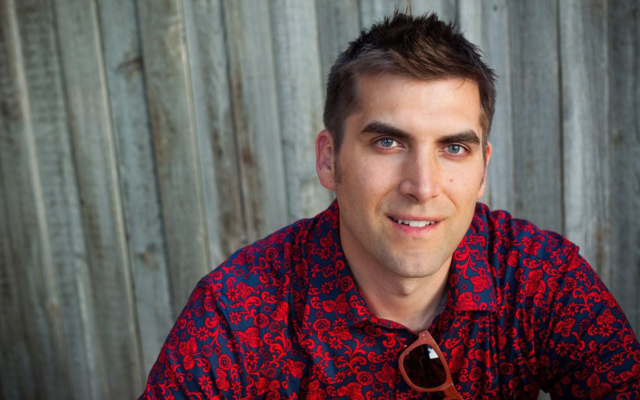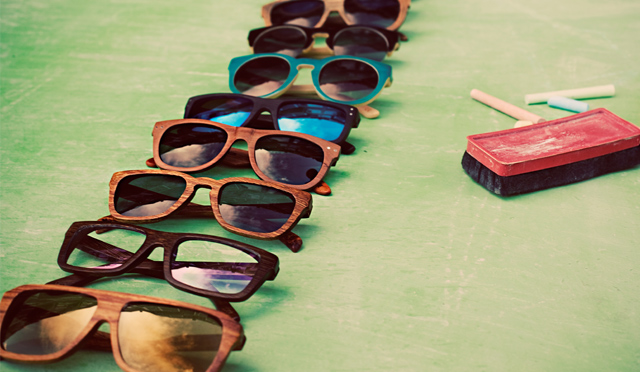
Idaho is the state most commonly known for potatoes and, well…potatoes. Brook Dames may have started the process of changing that perception of his home state as the CEO of Proof Eyewear.
Related Posts
Built from the ground up and located in the city of Boise, Proof Eyewear is a company that creates wooden glasses that have landed on the faces of celebrities including Beyonce and Snoop Dogg, and has grossed more than one million dollars in sales. I caught up with Brooks to discuss all things fashion, entrepreneurial success, and what it’s like walking away from ABC’s “Shark Tank” with all your limbs intact.
So they say hindsight is 20/20. What impact has being featured on ABC’s “Shark Tank” had on the company, and do you have any regrets about turning down their offers?
After we taped the show, we hopped in our rental car and kind of looked at each other like, “What did we just do? We turned down a ton of money.” But we resolved that we were going to do it with or without an investment from one of the sharks. So we got home and got back on our grind and started making some more moves and growing the business. Not getting a deal that worked for us really re-energized us to make Proof work. We ended up better than our forecast that we’d shared on the show and had a great year last year.
Since the show has aired, we have gotten more sales and more exposure, so we have no regrets about passing on the offer. We felt that the sharks were undervaluing our company; we knew the potential and went on to really grow the business.
After getting international televised recognition for your products, how much has your personal life changed since being featured on ABC? Any long lost friends or relatives popping up out of the woodwork these days?
No. (laughter) We get recognized on street a little more. And a few ex-girlfriends and college friends have shot us emails or friended us on Facebook. But at the end of the day, we are just three brothers from Idaho. We try to stay humble and stick to our roots. At the end of the day, being on the show was great. It gave us good exposure, but for us we have to execute our business plan and push for our goals. It takes a lot of time, and being a young company we have had to push to be successful, so we haven’t had a lot of time to just coast. Right after the show aired, we were back at the shop pushing out orders and working on the website to take advantage of the wave of orders that were coming through due to the exposure on “Shark Tank.”
It has been reported that your first conceptual product was a wooden ski pole. What inspired you to make the shift to wooden eyewear?
That’s true. I’ve always really liked wood. We grew up with it. We worked in our family’s sawmill stacking wood and sweeping sawdust, so it is a part of us. The ski pole idea I couldn’t get right, so I scrapped it. [But] I liked the idea of using wood as a medium for a consumer product — I [just] couldn’t find something that would work well. I saw a pair of old reading glasses from Japan made from bamboo sticks and thought, Why couldn’t we make sunglasses? That’s how it all started, and Proof Eyewear was born in my garage.
On ABC, you made mention that your family has a long lineage in the history of woodworking, How did your grandfather start the company that you and your father have now inherited?
He was a truck driver. Someone [once] owed him some money and couldn’t pay, so they gave him some woodworking equipment. From there he decided to give it a go. [Eventually, he] started making a little money. He would run it in Utah during the week and then run finished product down to California on the weekend. He was an innovator and just hustled. He grew our family business into a really big company with over 1,900 employees today. We owe a lot of our hustle to him and our dad for giving us opportunities to work and learn business.

The manufacturing process from tree to eyewear would seem to require a high level of precision. How did you figure out the requirements for the transition to mass production?
A lot of trial and error. We broke a lot of pairs and tools in the process.
We then began learning from big guys and seeing how they made plastic glasses, and we translated that to wood. We also have good partnerships who put great ideas and new technology in front of us. We have really refined our process and continuously improved our products over time.
Environmentalists have spoken out against the usage of wearable wooden accessories in the past. How do you feel about the usage of wood for fashion from an environmental perspective?
We have resources that are renewable and those that aren’t. Wood is renewable — we just have to manage it accordingly. Bamboo, which we use in our wallets and sunglasses, is actually a grass that grows super fast. Wood is a medium that we have used for a long long time and will continue to do so if we manage smartly. I think it is great to see people using mediums other than traditional ones like plastic. Plastic is usually oil based. There’s a tradeoff. It is interesting to me how a few years ago no one focused on sustainable brands or materials now it is all about how green you are. And how some brands aren’t green enough.
I think that people (environmentalist included) need to acknowledge how far the sustainable movement has come, and celebrate the steps companies are making big and small. Because sometimes its easier to not look at sustainable materials; sometimes its more profitable. So we should celebrate the progress we are making as companies and organizations to green up our products.
“60 Minutes” recently aired a special about the eyewear industry being monopolized by the Luxottica company, which either owns or controls the biggest players in the market. How worried are you about being able to compete with the companies they own, such as Ray-Ban or Sunglass Hut, once reaching a certain level of growth?
The whole industry is really controlled by one or two biggies who control and manufacture almost all the brands you are familiar with. Oakley, Ray-Ban, Gucci, Polo, Maui Jim, etc. We feel like we serve a niche market. We are a small brand and interact with our fans and customers. We [offer] big deals, [though] we don’t really hype a whole lot. We recycle our glasses. If you have a pair that are old, you can send them to us and we’ll grind them up and turn them into animal bedding.
We are also building an eye clinic in India with our partner Aravind Eye Care Hospital. We will build a clinic this year that will help 70,000 people a year in a rural area that is undeveloped. That may be the most exciting thing we are doing. And our customers support us and our mission, and they feel like they are a part of it all. You don’t get that with the big corporate eyewear companies.
Why did you feel compelled to get involved and contribute to a cause, like the Aravind eye clinic?
Our early motto was, “Look good. Do good.” We believe that you can get quality products and affect other people’s lives at the same time. That was our goal. So we did that one eye surgery at a time. As we grew bigger, we wanted to do more — so we partnered with the Aravind Eye Care Hospital in India and are building one of the first rural clinics for their organization.The investment is great, but we feel it is worthwhile to do our part as global citizens.
Companies can’t just profit and not give back — we have an obligation to help other people. So it is in my mind how you create sustainability as a company. Doing good and making money should go hand in hand, in my opinion.
I noticed that you have developed more than 50 different styles and color combinations. Did you have any background in fashion? Where did you get the inspirations for your designs?
Our mom graduated with a degree in fashion merchandising and interior design, and it rubbed off on us. We are inspired by our home state of Idaho and the people who live here. We are also inspired by classic vintage styles that are always going to be in style.
Do you have any advice for aspiring entrepreneurs out there that are trying to create their own products and acquire investments?
Screw it, just do it. Sometimes you can over-complicate things and spend so much time making sure things are perfect that you don’t get out there and actually do it. You will learn a lot even from failures, but you gotta take that first step. So we believe that entrepreneurs need to get out there and try some things. Some may work, some may fail, but you will learn and grow and be successful if your heart and drive is in the right place.
You have to do things because you love it. It can’t always be about the money. If you love it and are good, the money will come.
To find out more about Proof Eyewear, visit iwantproof.com
Click here to enter to win a pair of wooden sunglasses courtesy of Proof!